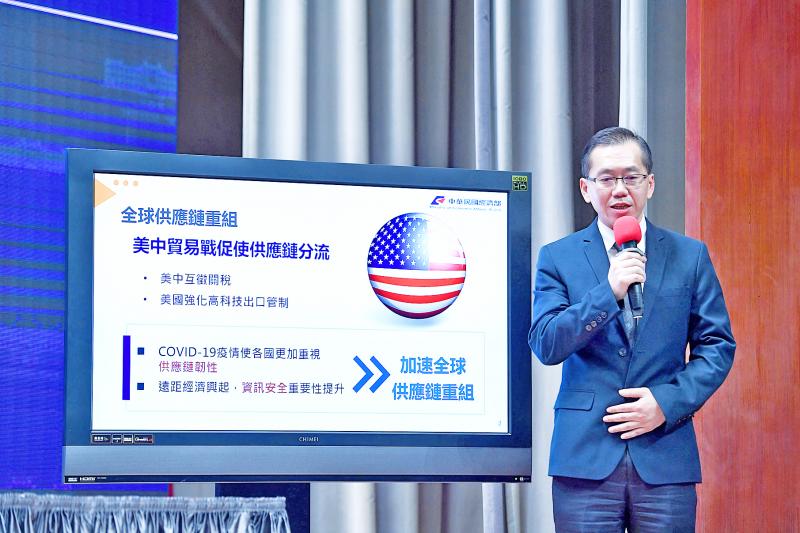Taiwan is eager to bolster cooperation with the US as the global supply chain undergoes restructuring, especially in the areas of semiconductors, communications, artificial intelligence (AI), green energy and precision healthcare, Premier Su Tseng-chang (蘇貞昌) said yesterday at a weekly Cabinet meeting.
His remarks followed a report by the Ministry of Economic Affairs on Taiwan-US partnerships in an era of global supply chain restructuring.
He instructed the ministry and other agencies to promote economic dialogue with the US, and to make concrete plans to achieve cooperation in strategic areas.

Photo: CNA
The US Department of State on Aug. 31 announced that the US and Taiwan would launch an Economic and Commercial Dialogue to be led by US Undersecretary of State for Economic Growth, Energy and the Environment Keith Krach, and “preparatory talks” were held during the undersecretary’s two-day visit last month.
Su said that the deepening of Taiwan-US economic ties and reorganization of the global supply chain are two of the government’s most important policy goals.
He highlighted four strategic areas: semiconductors, communications, AI and other cutting-edge technologies; green energy and innovative industries; healthcare industries; and development of the global market.
Cooperation would enormously benefit the two nations, Su said, citing estimates by industry experts that these areas would help the US to generate hundreds of billions of dollars in additional value, as well as hundreds of thousands, or even millions, of job opportunities.
Stepping up economic cooperation has become a hot topic in Taiwan and the US, Su said, adding that several US lawmakers, government departments and business groups have called on US President Donald Trump’s administration to initiate bilateral trade agreement negotiations with Taiwan.
These voices in the US not only reflect the extensive support that the US has for Taiwan in the public and private sectors, but also highlights that Taiwan-US economic cooperation is a mutually beneficial matter, he said.
If Taiwan’s advantages in semiconductor manufacturing were further enhanced by the US’ capabilities in technology and research and development — through trade, investment and the reorganization of the global supply chain — huge economic benefits could be expected, he said.
Taiwan Semiconductor Manufacturing Co’s (台積電) plans to set up factories in the US are a textbook example of such strategic cooperation, he added.
A rapidly changing global economic and trade environment has made supply chain reorganization an unstoppable trend, Su said, adding that this is the best time for Taiwan and the US to bolster economic ties.
Deepening Taiwan-US cooperation would not only help the US to achieve its goal of “bringing manufacturing back to the US,” it would also consolidate Taiwan’s position in the global supply chain, he said.

MAKING WAVES: China’s maritime militia could become a nontraditional threat in war, clogging up shipping lanes to prevent US or Japanese intervention, a report said About 1,900 Chinese ships flying flags of convenience and fishing vessels that participated in China’s military exercises around Taiwan last month and in January have been listed for monitoring, Coast Guard Administration (CGA) Deputy Director-General Hsieh Ching-chin (謝慶欽) said yesterday. Following amendments to the Commercial Port Act (商港法) and the Law of Ships (船舶法) last month, the CGA can designate possible berthing areas or deny ports of call for vessels suspected of loitering around areas where undersea cables can be accessed, Oceans Affairs Council Minister Kuan Bi-ling (管碧玲) said. The list of suspected ships, originally 300, had risen to about 1,900 as

Right-wing political scientist Laura Fernandez on Sunday won Costa Rica’s presidential election by a landslide, after promising to crack down on rising violence linked to the cocaine trade. Fernandez’s nearest rival, economist Alvaro Ramos, conceded defeat as results showed the ruling party far exceeding the threshold of 40 percent needed to avoid a runoff. With 94 percent of polling stations counted, the political heir of outgoing Costa Rican President Rodrigo Chaves had captured 48.3 percent of the vote compared with Ramos’ 33.4 percent, the Supreme Electoral Tribunal said. As soon as the first results were announced, members of Fernandez’s Sovereign People’s Party

Japan’s strategic alliance with the US would collapse if Tokyo were to turn away from a conflict in Taiwan, Japanese Prime Minister Sanae Takaichi said yesterday, but distanced herself from previous comments that suggested a possible military response in such an event. Takaichi expressed her latest views on a nationally broadcast TV program late on Monday, where an opposition party leader criticized her for igniting tensions with China with the earlier remarks. Ties between Japan and China have sunk to the worst level in years after Takaichi said in November that a hypothetical Chinese attack on Taiwan could bring about a Japanese

MORE RESPONSIBILITY: Draftees would be expected to fight alongside professional soldiers, likely requiring the transformation of some training brigades into combat units The armed forces are to start incorporating new conscripts into combined arms brigades this year to enhance combat readiness, the Executive Yuan’s latest policy report said. The new policy would affect Taiwanese men entering the military for their compulsory service, which was extended to one year under reforms by then-president Tsai Ing-wen (蔡英文) in 2022. The conscripts would be trained to operate machine guns, uncrewed aerial vehicles, anti-tank guided missile launchers and Stinger air defense systems, the report said, adding that the basic training would be lengthened to eight weeks. After basic training, conscripts would be sorted into infantry battalions that would take